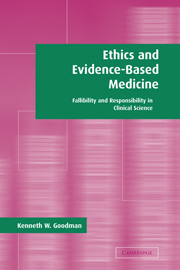Book contents
- Frontmatter
- Contents
- Preface
- Acknowledgments
- 1 Foundations and history of evidence-based practice
- 2 The research synthesis revolution
- 3 Evidence of evidence, and other conceptual challenges
- 4 Human subjects, the Internet, databases, and data mining
- 5 Evidence at the bedside
- 6 Public health policy, Uncertainty, and genetics
- 7 Ethics and evidence
- References
- Index
5 - Evidence at the bedside
Published online by Cambridge University Press: 29 September 2009
- Frontmatter
- Contents
- Preface
- Acknowledgments
- 1 Foundations and history of evidence-based practice
- 2 The research synthesis revolution
- 3 Evidence of evidence, and other conceptual challenges
- 4 Human subjects, the Internet, databases, and data mining
- 5 Evidence at the bedside
- 6 Public health policy, Uncertainty, and genetics
- 7 Ethics and evidence
- References
- Index
Summary
There is nothing remarkable in being right in the great majority of cases in the same district, provided the physician knows the signs and can draw the correct conclusions from them.
Hippocrates (1983)Evidence-based practice imposes extraordinary obligations on ordinary clinicians. Not only must the individual monitor salient scientific developments, he or she must plot performance against that of colleagues. The obligation to adjust one's practice in the face of “outcomes data” makes ethical sense only if we demand greater familiarity with the scientific literature, an ability to evaluate this literature critically, a clearer sense of the validity of outcomes studies, and an understanding of research methods ranging from randomized controlled trials to meta-analysis. This is a lot to ask of folk who, they will protest, just wanted to practice medicine. Contrarily, the ethical duty to conform to some kind of evidence-based standard (as long recognized by the need for continuing medical education) makes it difficult to know how much weight to assign to such a protest. At the end of the day there is a patient, a body of knowledge, and a need to decide how to proceed.
Cookbooks, algorithms, and guidelines
Physicians, nurses, and other clinicians would do well to eavesdrop on one of the larger, more interesting, and long-standing debates in the philosophy of science. While the debate has ancient origins, its contemporary flavor and importance are rich and immediate.
- Type
- Chapter
- Information
- Ethics and Evidence-Based MedicineFallibility and Responsibility in Clinical Science, pp. 91 - 112Publisher: Cambridge University PressPrint publication year: 2002



